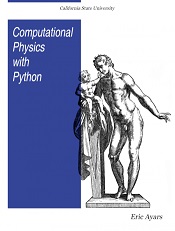
|
FreeComputerBooks.com
Links to Free Computer, Mathematics, Technical Books all over the World
|
|
- Title: Computational Physics with Python
- Author(s) Eric Ayars
- Publisher: California State University
- Hardcover/Paperback: N/A
- eBook: PDF (194 pages, 7.5 MB)
- Language: English
- ISBN-10: N/A
- ISBN-13: N/A
- Share This:

|
The use of computation and simulation has become an essential part of the scientific process. Being able to transform a theory into an algorithm requires significant theoretical insight, detailed physical and mathematical understanding, and a working level of competency in programming.
This upper-division text provides an unusually broad survey of the topics of modern computational physics from a multidisciplinary, computational science point of view. Its philosophy is rooted in learning by doing (assisted by many model programs), with new scientific materials as well as with the Python programming language. Python has become very popular, particularly for physics education and large scientific projects.
It is probably the easiest programming language to learn for beginners, yet is also used for mainstream scientific computing, and has packages for excellent graphics and even symbolic manipulations.
About the Authors- N/A
- Python Programming
- Physics, Computational Physics, and Mathematical Physics
- Data Structures and Algorithms

- Computational Physics with Python (Eric Ayars)
- The Mirror Site (1) - PDF
- The Mirror Site (2) - PDF
- Computational Physics: Problem Solving with Python (Rubin H. Landau, et al.)
-
 Computational Physics with Python (Mark Newman)
Computational Physics with Python (Mark Newman)
A complete introduction to the field of computational physics, with examples and exercises in the Python programming language. It explains the fundamentals of computational physics and describes in simple terms the techniques that every physicist should know,.
-
 Percolation Theory Using Python (Anders Malthe-Sørenssen)
Percolation Theory Using Python (Anders Malthe-Sørenssen)
This course-based open access textbook delves into Percolation Theory, examining the physical properties of random media—materials characterized by varying sizes of holes and pores.
-
 Computational Physics and Scientific Computing: C++ or Fortran
Computational Physics and Scientific Computing: C++ or Fortran
This book is an introduction to the computational methods used in physics, but also in other scientific fields. Both C++ or Fortran are used for programming the core programs and data analysis is performed using the powerful tools of the Gnu/Linux environment.
-
 Computational Physics: An Introduction (Franz J. Vesely)
Computational Physics: An Introduction (Franz J. Vesely)
A concise introduction to the methods and algorithms used in computational physics, clear in its presentation, useful for those beginning more advanced work in the field. Sample programs are be written in JAVA and are accompanied by short explanations.
-
 Modeling and Simulation in Python (Allen B. Downey)
Modeling and Simulation in Python (Allen B. Downey)
This book is an introduction to physical modeling using a computational approach with Python. You will learn how to use Python to accomplish many common scientific computing tasks: importing, exporting, and visualizing data; numerical analysis; etc.
-
 Programming for Computations - Python 3 Edition
Programming for Computations - Python 3 Edition
This book outlines the shortest possible path from no previous experience with programming to a set of skills that allows students to write simple programs for solving common mathematical problems with numerical methods in the context.
-
 Scipy Lecture Notes (Emmanuelle Gouillart, et al)
Scipy Lecture Notes (Emmanuelle Gouillart, et al)
This book teaches the scientific Python ecosystem, a quick introduction to central tools and techniques. It is for programmers from beginner to expert. Work on real-world problems with SciPy, NumPy, Pandas, scikit-image, and other Python libraries.
-
 Solving PDEs in Python: The FEniCS Tutorial I (H. Langtangen)
Solving PDEs in Python: The FEniCS Tutorial I (H. Langtangen)
This book offers a concise and gentle introduction to finite element programming in Python based on the popular FEniCS software library. Using a series of examples, it guides readers through the essential steps to quickly solving a PDE in FEniCS.
-
 From Python to NumPy (Nicolas P. Rougier)
From Python to NumPy (Nicolas P. Rougier)
NumPy is one of the most important scientific computing libraries available for Python. This book teaches you how to achieve expert level competency to perform complex operations, with in-depth coverage of advanced concepts.
-
 Introduction to Scientific Programming with Python
Introduction to Scientific Programming with Python
This book offers an initial introduction to programming for scientific and computational applications using the Python programming language. The presentation style is compact and example-based, assuming little or no prior experience in programming.
-
 Python for Everybody: Exploring Data in Python 3
Python for Everybody: Exploring Data in Python 3
This book is designed to introduce students to programming and software development through the lens of exploring data. You can think of the Python programming language as your tool to solve data problems that are beyond the capability of a spreadsheet.
-
 Automate the Boring Stuff with Python (Albert Sweigart)
Automate the Boring Stuff with Python (Albert Sweigart)
Learn how to use Python to write programs that do in minutes what would take you hours to do by hand - no prior programming experience required. You'll create Python programs that effortlessly perform useful and impressive feats of automation.





